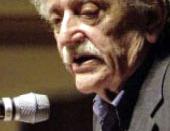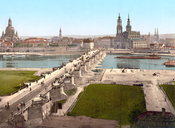Kurt Vonnegut's Slaughterhouse-Five or the Children's Crusade mixes degrees of autobiography, documentary, and fantasy in an attempt to produce a book about Dresden in the time period of World War II. The autobiographical aspect is apparent in the war scenes of the novel. And the documentary and the fantastic are demonstrated through a set of imaginary novels by Kilgore Trout and the main character, Billy Pilgrim. Vonnegut wrote Slaughterhouse-Five in an endeavor to create "a masterpiece or at least make me a lot of money". However, the novel more successfully captures the surrealism of war and those who are engaged therein.
Mary O'Hare's opinion is one example of the surrealism experienced through warfare. Mary is totally against the idea and practice of war, especially the glorification of it through books and movies. She is angered that Billy comes to visit with her husband, Bernard, asking for his input about the war in Dresden.
Her loathing of the war becomes blatantly obvious when she bursts out, "You were just babies then! ... - like the ones upstairs! ... You'll pretend you were men instead of babies, and you'll be played in the movies by Frank Sinatra and John Wayne or some of those other glamorous, war-loving, dirty old men. And war will look just wonderful, so we'll have a lot more of them. And they'll be fought by babies, like the babies upstairs" (13). She is almost completely unable to fathom another instance where little children are fighting a war that adults have brewed.
To counter the obviously disparity that is a result of warfare, Harrison Starr argues that there will always be wars and that they're as easy to stop as glaciers. Even if enormous death isn't caused by war, according to Vonnegut "there would still be plain old...


